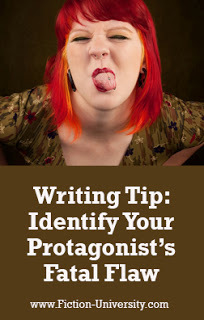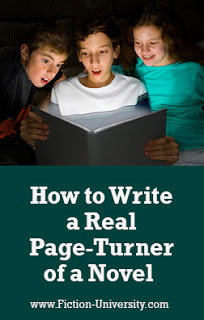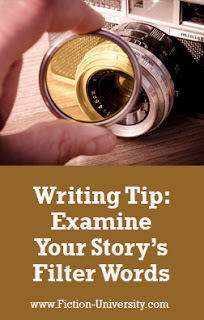Janice Hardy's Blog, page 81
February 26, 2019
What Type of Violent Offender Is Your Villain?
 By Bonnie Randall
By Bonnie Randall Part of the How They Do It Series (Contributing Author)
Within my work with Violent Threat Risk Assessment, I share characteristics of the four most dominant violent offenders; what motivates them, what personality traits each has, their inherent goals, and how they are most likely to react if / when they are caught.
The four types of offenders are easily identifiable in fiction, film, and real life once you know what you are looking for. And, in turn, villains are much easier to create when you have the recipe of characteristics that create the perfect storm that forms The Violent Offender.
So, without further ado, let’s examine the four types of violent offenders, starting with:
Continue ReadingWritten by Janice Hardy. Fiction-University.com

Published on February 26, 2019 04:33
February 25, 2019
The Difference Between Archetypes, Tropes, and Clichés
 By Janice Hardy, @Janice_Hardy
By Janice Hardy, @Janice_Hardy Understanding archetypes, tropes, and clichés makes writing original stories a lot easier.
Before we dive in today, just a little heads up that I’m also guesting posting on The Insecure Writer’s Support Group, with 4 Things Every Novel Should Strive For. Come on by and say hello!
A lot of elements in writing are either interconnected or used interchangeably, and archetypes, tropes, and clichés are three of them. What one writer views as an archetype, another might consider a cliché, and how they use them in their writing can differ. Some writers can wield a trope like a master, others can sneak cliches in so they feel germane to the scene, and some write such nuanced archetypes readers don’t even realize they are archetypes.
As a writer—especially as a genre writer—it’s vital to understand the differences between these terms and how they work in fiction.
Continue ReadingWritten by Janice Hardy. Fiction-University.com

Published on February 25, 2019 04:39
February 24, 2019
Sunday Writing Tip: Identify Your Protagonist’s Fatal Flaw
 By Janice Hardy, @Janice_Hardy
By Janice Hardy, @Janice_Hardy Each week, I’ll offer a writing tip you can take and apply to your WIP to help improve it. They’ll be easy to do and shouldn’t take long, so they’ll be tips you can do without taking up your Sunday. Though I do reserve the right to offer a good tip now and then that will take longer—but only because it would apply to the entire manuscript.
This week, take a moment and identify your protagonist’s fatal flaw, and make sure that it plays a role in both the character arc, and the plot.
Unless you’re writing a series with a non-changing protagonist, such as a detective, spy, or “person with a specific job” type who doesn’t have a character arc, you’ll likely want a fatal flaw. This is the flaw at the center of the character arc, and the issue the protagonist needs to overcome or grow out of by the end of the book.
Continue ReadingWritten by Janice Hardy. Fiction-University.com

Published on February 24, 2019 04:29
February 23, 2019
Real Life Diagnostics: Does This Middle Grade Opening Draw You In?
 Critique By Janice Hardy, @Janice_Hardy
Critique By Janice Hardy, @Janice_HardyReal Life Diagnostics is a weekly column that studies a snippet of a work in progress for specific issues. Readers are encouraged to send in work with questions, and we diagnose it on the site. It’s part critique, part example, and designed to help the submitter as well as anyone else having a similar problem.
If you're interested in submitting to Real Life Diagnostics, please check out these guidelines.
Submissions currently in the queue: Three
Please Note: As of today, RLD slots are booked through March 16.
This week’s questions:
Does this opening page work? Does the first paragraph pull you in? Or does it sound to young and ordinary?
Market/Genre: Middle Grade
On to the diagnosis…
Continue ReadingWritten by Janice Hardy. Fiction-University.com

Published on February 23, 2019 05:31
February 22, 2019
Twitter Pitch Like You Mean It!
 By Alex J. Cavanaugh, @AlexJCavanaugh
By Alex J. Cavanaugh, @AlexJCavanaugh Part of The Writer's Life Series
JH: Pitch parties have grown more popular over the years, and many a writer has found an agent through one. Alex J. Cavanaugh takes to the podium today to share just how these pitch parties work.
Alex J. Cavanaugh works in web design, graphics, and technical editing. A fan of all things science fiction, his interests range from books and movies to music and games. Online he is the Ninja Captain and founder of the Insecure Writer’s Support Group, which hosts #IWSGPit every January. He’s the author of Amazon Best-Sellers CassaStar, CassaFire, CassaStorm, and Dragon of the Stars . The author lives in the Carolinas with his wife.
Website | Insecure Writers Support Group | Twitter
Take it away Alex…
Continue ReadingWritten by Janice Hardy. Fiction-University.com

Published on February 22, 2019 03:00
February 21, 2019
February 20, 2019
Act One: All Setup or Does it Need More?
 By Janice Hardy, @Janice_Hardy
By Janice Hardy, @Janice_Hardy How much goes into setting up the beginning of a novel?
Novel beginnings don’t make it easy on us poor writers. We have to introduce characters, set the scene, ground readers in a new world (real life or make believe), and we have to do something compelling to entice those readers to keep reading.
Story structure helps with this, giving us a proven path to take after that first sentence is written: Opening scene leads to inciting event leads to end of act one. That encompasses the beginning, and act one is essentially the part of the novel where the story is set up. Introduce the protagonist, put them on the plot path, and turn them loose to resolve the story’s conflict.
And that’s where the trouble starts for some writers.
They have the opening scene down pat. They know what the inciting event is. But after that it gets fuzzy, and they wonder…
Continue ReadingWritten by Janice Hardy. Fiction-University.com

Published on February 20, 2019 05:47
February 19, 2019
How to Write a Real Page-Turner
 By Laurisa White Reyes, @lwreyes
By Laurisa White Reyes, @lwreyes Part of the How They Do It Series
JH: No matter what they write, I think every writer hopes for a book readers can’t put down. Please help me welcome Laurisa White Reyes to the lecture hall today, to share some tips on how to create a page-turner.
Laurisa White Reyes is the Senior Editor of Skyrocket Press & Author Services. She has published sixteen books, including 8 Secrets to Successful Self-Publishing and the SCBWI Spark Award winner The Storytellers . Laurisa also provides personal coaching for writers. To connect with her, visit Skyrocket Press.
Website | Facebook | Twitter | Goodreads |
Take it away Laurisa…
Continue ReadingWritten by Janice Hardy. Fiction-University.com

Published on February 19, 2019 04:30
February 18, 2019
Goals-Motivations-Conflicts: The Engine That Keeps a Story Running
 By Janice Hardy, @Janice_Hardy
By Janice Hardy, @Janice_Hardy Without a strong GMC, your story engine can stall.
With “What’s your story about?” being a common question for writers, it’s easy to think about our stories as being one conflict or idea. We pose a problem, and then the book is spent trying to solve that problem. We postulate an idea, and we go on to explore that idea. We introduce a character, and we live in that character’s life for a while.
While stories might be about one problem, the plot is actually made up of many pieces all building on each other toward a resolution. Just like words form sentences, sentences form paragraphs, and paragraphs form pages, which is turn create scenes that form chapters and chapters that form acts. Everything builds to create a larger construct.
At the end of it all, is a novel (or short story if you prefer).
Continue ReadingWritten by Janice Hardy. Fiction-University.com

Published on February 18, 2019 06:03
February 17, 2019
Sunday Writing Tip: Examine Your Filter Words
 By Janice Hardy, @Janice_Hardy
By Janice Hardy, @Janice_Hardy Each week, I’ll offer a tip you can take and apply to your WIP to help improve it. They’ll be easy to do and shouldn’t take long, so they’ll be tips you can do without taking up your Sunday. Though I do reserve the right to offer a good tip now and then that will take longer—but only because it would apply to the entire manuscript.
This week, eliminate or revise any filter words that aren’t working
Filter words are words that put an extra layer between the POV character and the reader, such as thought, knew, realized, felt, smelled, heard, etc. They’re a form of telling, and can distance readers from the story. The narrative distance determines how told a filter word feels. A close narrative distance, such as first person, feels very told if a lot of filter words are used, where an distant omniscient narrator isn’t as affected by them, because the entire story is filtered through an outside narrator.
Continue ReadingWritten by Janice Hardy. Fiction-University.com

Published on February 17, 2019 05:23



